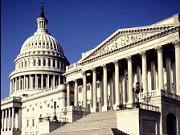 Chris Graham of the Augusta Free Press has a provocative story on the increasing attention Congress appears to be investing in the oversight of sports. (Graham, "The Politics of Sport," August Free Press, 12/19/2005). We have seen that trend with steroids/baseball, the BCS hearings, and the prospect of a Congressional inquiry into the antitrust implications of the Eagles suspending Terrell Owens.
Chris Graham of the Augusta Free Press has a provocative story on the increasing attention Congress appears to be investing in the oversight of sports. (Graham, "The Politics of Sport," August Free Press, 12/19/2005). We have seen that trend with steroids/baseball, the BCS hearings, and the prospect of a Congressional inquiry into the antitrust implications of the Eagles suspending Terrell Owens.
Chris interviews several persons for this story, including me. As former House Judiciary Committee Fellow to U.S. Rep. Marty Meehan, I take particular interest in this issue. Here are some excerpts:
"The sports industry is a huge industry, and it's largely unregulated, or at least is self-regulated. It makes billions of dollars a year, and its stars are held in high regard in particular by our nation's youth. Sports has an important role to play in our society, so from that perspective, it's not surprising to see Congress wanting to step in and get involved when something seems to go awry," said Matt Smyth, a politics analyst with the University of Virginia Center for Politics.
"Some say the sports industry should be allowed to function outside the realm of accountability and everyday citizen concern. Professional sports are now the 10th-largest industry in the United States, generating $220 billion in revenue every year. They are also one of the largest recipients of corporate welfare, with taxpayers subsidizing new stadiums across the country one after another. And the leagues effectively operate as monopolies, with MLB officially operating as a monopoly with their antitrust exemption," said Shawn McCarthy, the director of the Washington, D.C.,-based League of Fans, a sports-reform group founded by consumer advocate and former presidential candidate Ralph Nader.
"Congress' involvement was critical. The threats of Sen. Jim Bunning and Sen. John McCain, in my opinion, greatly animated baseball to act," said Michael McCann, a professor at the Mississippi College School of Law and a regular contributor to The Sports Law Blog."Congress finally stepped up to the plate, no pun intended, and said, look, this is ridiculous. We cannot have role models be those who engage in steroid use. There's a national interest in seeing this kind of behavior curbed, and moreover, you guys aren't doing anything about it. The sanctions that you've imposed seem to be without much in the way of deterrent," McCann told the AFP.
"Their constant attack on baseball and requiring Bud Selig and Donald Fehr to go to Congress and testify had a big effect. It really shook them up," McCann said . . .
Particularly for Republicans, whose operating mantra is focused on limited government and limited involvement in the operations of the business and industry sectors, "you want to be consistent across the board . . . So there's a careful balancing act that has to be performed here," Smyth said.
And more generally speaking, McCann said, "Congress has to be wary to put sports in perspective.""Clearly, we have an unpopular war. We have a not-clearly-successful recovery effort from Hurricane Katrina. There are obviously issues of greater national prominence that Congress should direct most of its attention to," McCann said.
"If Congress feels that it has time to address these sports issues, it's a good thing. But not at the expense of the bigger issues," McCann said.
What is the optimal role for Congress in the oversight of sports?





0 comments:
Post a Comment